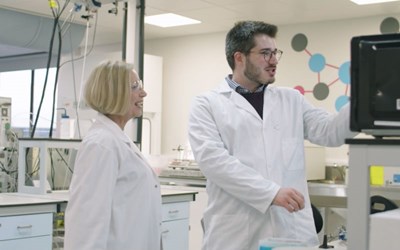QV Bioelectronics receives support to go transnational
Manchester-based start-up QV Bioelectronics is developing innovative electrotherapy devices for the treatment of certain types of brain tumours with the help of the transnational MATMED programme.
Since becoming involved with the MATMED programme we’ve received funding towards a collaboration with specialist technical skills that we don’t have in our company and so it’s been valuable to have the support to allow that collaboration to take place.
Dr Chris Bullock, Co-Founder and Managing Director
MATMED was launched in 2019 and supports MedTech companies in Greater Manchester to innovate with advanced materials for medical applications. It offers a transnational network of potential business partners, voucher funding of up to €40,000 for collaborative projects and expert advice on the 2020 regulatory framework for medical devices.
Co-founder and MD of QV Bioelectronics, Dr Chris Bullock (pictured below with GC Business Growth Hub healthcare and life sciences advisor Susan Ingham) talks to the Hub about how MATMED has impacted their plans for the future:

We need to do more to improve our treatment of brain tumours
Compared to other diseases, the incidence of brain tumours is rare, but the social and economic impact on society is disproportionately significant. They result in loss of independence, suffering for patients and their loved ones, and loss of life, while a 2018 parliamentary report estimated the UK economic costs of brain tumours to be £578 million each year, the third highest of all cancers despite the comparatively small numbers of patients.
In recent decades there has been significant progress made in improving the treatment of many cancers, but a relative lack of progress when it comes to the clinical outcomes for brain tumours, particularly for its most aggressive form, glioblastoma multiforme (GBM).
We founded QV Bioelectronics in 2018 to develop innovative approaches for the treatment of brain tumours and that’s what we’re working towards, through a new implanted electrotherapy device.
Improving patients’ lives is key for us
Our device is aimed at both improving the clinical outcomes and also quality of life for brain tumour patients. Electricity has been applied to the body for the clinical management of medical conditions for decades, whether that’s through cardiac pacemakers or deep brain stimulation for the relief of Parkinson disease symptoms.
A number of studies have suggested that electrical stimulation can be used to interfere with cell division and we’re attempting to use this technology to slow tumour growth with the possibility that this might extend patients’ lives.
The research and technology development remains highly experimental at this stage, and we are still a number of years away before being in a position to test our device in patients.
Our Manchester home plays a huge role in our technology
Developing an implanted electrotherapy device such as ours is a huge technical challenge and requires the use of advanced materials in order to safely deliver the treatment as a long-term implant within the brain tissue. Manchester is internationally recognised as a leading centre for materials research, particularly in advanced medical applications, and access to the skills, expertise and facilities of the region are very important to us.
Gaining support from programmes like MATMED is crucial for us
As a company we’re just over a year old and still at the early stages of developing our technology. This means that the use of support programmes like this can really help us to get some traction in those early research and development steps. Developing new medical technologies is really tough, there’s big regulatory barriers that we have to overcome, and we have to do a lot with not very much money.
While our local heritage is important to us, as a company based in the north of England, obviously Europe is a really important market for us, so what we hope is that through MATMED we’ll be able to access other potential partners in Europe that will really help us to bring our device to the market.
Since becoming involved with the MATMED programme we’ve received funding towards a collaboration with a company in Belgium called CellSine. They are real experts in this area, with specialist technical skills that we don’t have in our company and so it’s been valuable to have the support to allow that collaboration to take place.
Being supported to access this unique international expertise has really accelerated our progress and growth.
Businesses using advanced materials for medical applications can access fully-funded support through the MATMED programme to nurture collaboration, commercialisation and funding opportunities, by registering here: www.matmed.eu.
Greater Manchester SMEs can contact Healthcare and Life Sciences advisor Susan Ingham directly here.
MATMED is an Interreg North-West programme funded by the European Commission.
Businesses can also access specialist healthcare and life sciences support here.